What is a knowledge worker?
A knowledge worker is a term coined by management consultant and author Peter Drucker in the late 1950s to describe a category of workers whose primary role involves handling or creating information, knowledge, and data as a core part of their job.

Table of contents
Unlike traditional manual laborers who primarily work with their hands, knowledge workers rely on their intellect, analytical skills, and expertise to perform their tasks.
Knowledge workers typically engage in activities such as research, analysis, problem-solving, decision-making, digital innovation, and communication.
They often work in industries such as technology, finance, healthcare, education, research, consulting, and various professional services where their ability to process and generate knowledge is central to their role.
The concept of knowledge workers has become increasingly important in the information age, as the global economy has shifted towards industries that rely heavily on knowledge and intellectual capital.
Effective management of knowledge workers and their expertise has become critical to many organizations’ success.
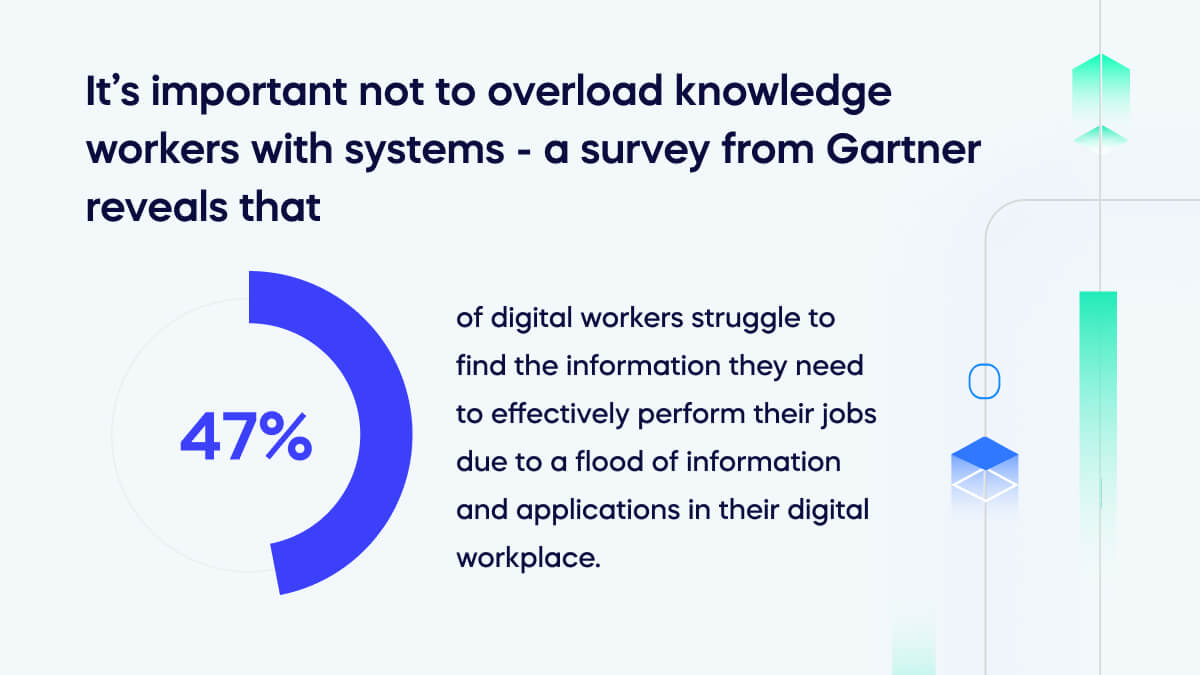
Knowledge workers are part of the knowledge economy – an economic system in which the generation, acquisition, and application of knowledge and information play a significant role in creating wealth and the growth of businesses and industries.
In a knowledge economy, the traditional factors of production, such as raw materials and labor, are complemented and often overshadowed by the importance of knowledge, innovation, and intellectual assets.
Essential skills for knowledge workers
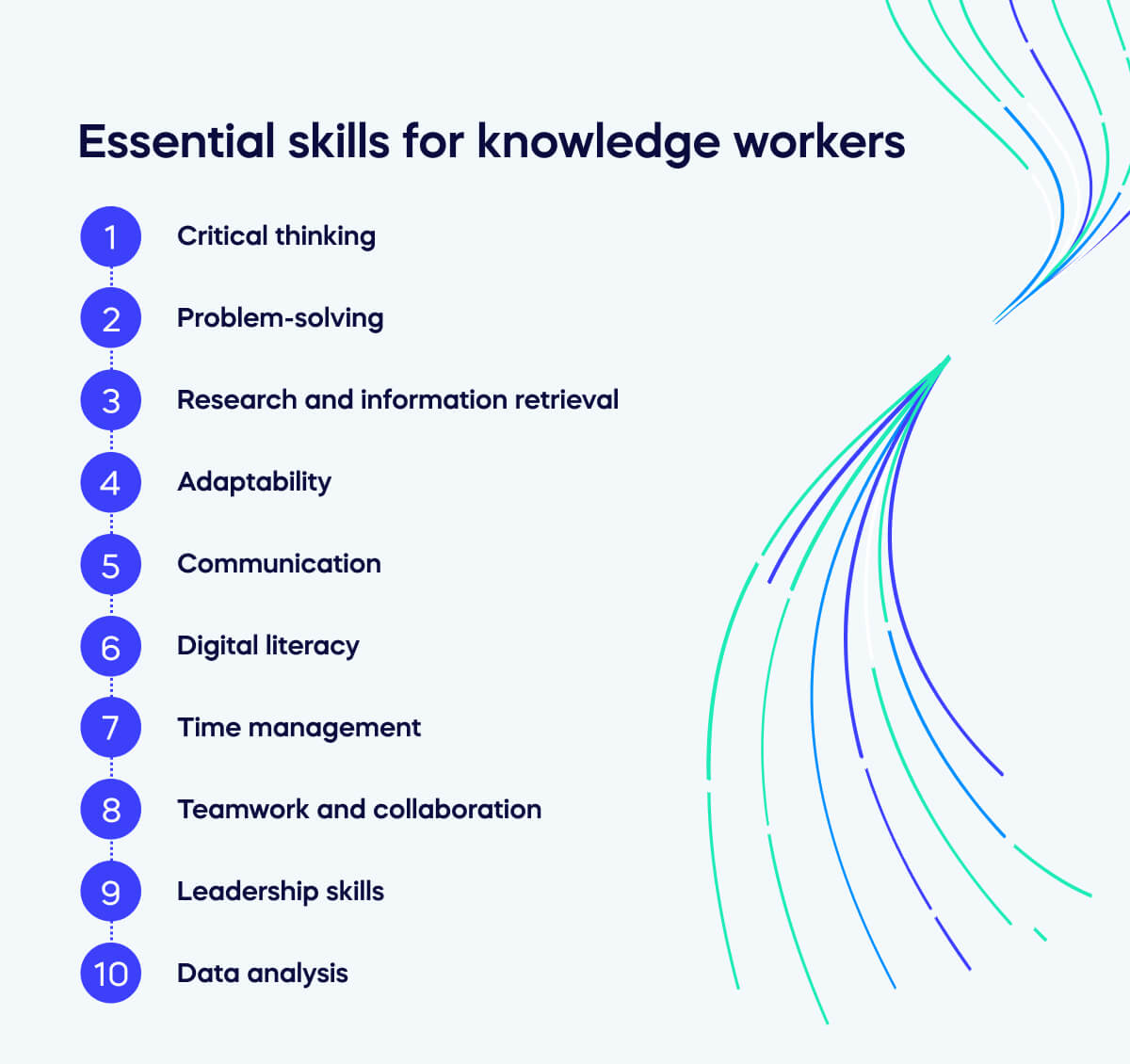
Knowledge workers rely on their academic abilities, expertise, and problem-solving skills to perform their tasks effectively.
To succeed in a knowledge-driven environment, knowledge workers need a combination of technical, cognitive, and soft skills.
These are as follows:
Critical thinking
Knowledge workers must be able to analyze information, identify patterns, and evaluate complex situations to make informed decisions. Critical thinking involves logical reasoning and the ability to consider multiple perspectives.
Problem-solving
They should excel at finding solutions to intricate problems, often using creative and innovative approaches. Problem-solving skills involve identifying issues, generating options, and selecting the best course of action.
Research and information retrieval
Knowledge workers often need to gather and synthesize information from various sources. Strong research skills and the ability to navigate databases, libraries, and online resources are crucial.
Adaptability
In a rapidly changing environment, knowledge workers must adapt to new technologies, tools, and processes. Being open to change and willing to learn new skills is essential.
Communication
Effective communication is vital for conveying ideas, collaborating with colleagues, and presenting findings or recommendations. This includes both written and verbal communication skills.
Digital literacy
Knowledge workers should be proficient in using digital tools and technology, including familiarity with software applications, data analysis tools, and online collaboration platforms.
Time management
Managing multiple tasks, projects, and deadlines is a common aspect of knowledge work. Time management skills help prioritize tasks and allocate time efficiently.
Teamwork and collaboration
Even though knowledge work can be solitary at times, collaboration is often essential. Knowledge workers should be able to work effectively in teams, share knowledge, and contribute to group efforts.
Leadership skills
Knowledge workers often need leadership skills to influence others, lead projects, or take initiative, even if not in formal leadership roles.
Data analysis
Knowledge workers need strong data analysis skills in fields like data science and analytics to extract meaningful insights from large datasets.
Examples of knowledge work
Knowledge work involves using intellectual and creative abilities to solve complex problems, make decisions, and generate new insights.
It often requires applying specialized knowledge, critical thinking, and problem-solving skills.
Here are some examples of knowledge work:
Research
Conducting scientific, academic, or market research to gather and analyze data to create new knowledge or make informed decisions.
Software development
Designing, coding, and testing software applications or systems often requires a deep understanding of programming languages and algorithms.
Data analysis
Analyzing large datasets to extract meaningful insights, make data-driven decisions, and identify trends or patterns.
Content creation
Writing, editing, and producing various types of content, such as articles, reports, blog posts, videos, and marketing materials.
Consulting
Providing expert advice and guidance to clients or organizations in areas like management, finance, marketing, or technology.
Project management
Overseeing and coordinating complex projects, including planning, scheduling, and problem-solving.
Design
Creating visual designs for products, websites, marketing materials, and other media involving graphic design, user experience (UX) design, or industrial design.
Legal work
Legal professionals engage in tasks such as legal research, contract drafting, and providing legal counsel to clients.
Medicine
Diagnosing and treating patients and conducting medical research and clinical trials.
Teaching and education
Developing curriculum, instructing students, and conducting educational research.
Financial analysis
Evaluating financial data, managing investments, and making investment recommendations.
Architecture
Designing buildings and structures, including drafting blueprints and overseeing construction projects.
Marketing strategy
Developing marketing plans, analyzing consumer behavior, and identifying strategies for brand promotion.
Policy analysis
Researching and evaluating policies, laws, and regulations and providing recommendations for change or improvement.
Journalism
Investigating, reporting, and writing news stories often requiring in-depth research and analysis.
Engineering
Designing and optimizing products, systems, and processes, including mechanical, electrical, and civil engineering.
Intellectual property
Managing patents, copyrights, trademarks, and other intellectual property rights.
Benefits of knowledge workers
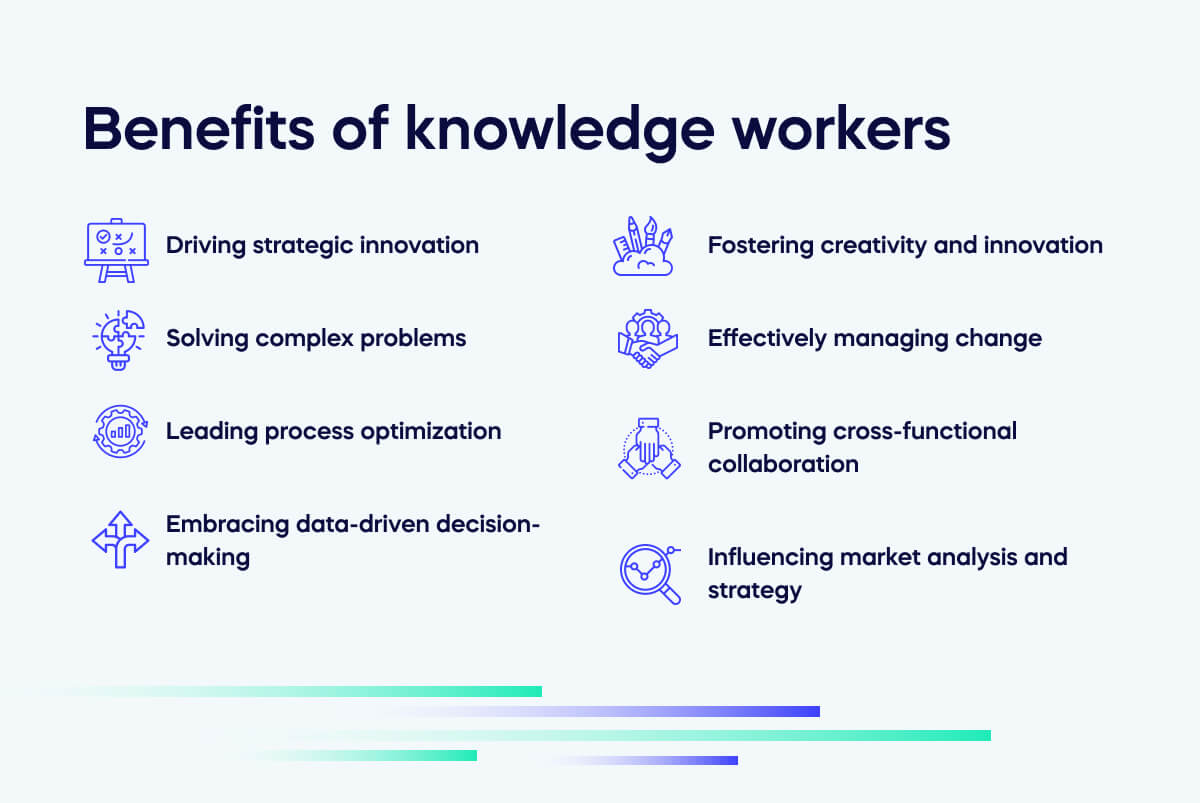
Knowledge workers bring several significant benefits to workplaces due to their specialized skills, intellectual capabilities, and problem-solving abilities.
Here are some of the key benefits of knowledge workers in the workplace:
Driving strategic innovation
Professionals in knowledge-intensive roles are catalysts for strategic innovation, introducing new ideas and approaches that promote growth.
Solving complex problems
Specialized expertise equips these individuals with the ability to tackle complex problems, which often require unique skills and analytical thinking.
Leading process optimization
Many professionals in knowledge roles are instrumental in driving process optimization enhancing efficiency and effectiveness.
Embracing data-driven decision-making
They excel in data-driven decision-making, utilizing analytical skills to make informed choices.
Fostering creativity and innovation
Professionals in these roles often foster a culture of creativity and innovation, resulting in innovative solutions and products.
Effectively managing change
Adaptability and effective change management are key characteristics of knowledge workers, making them invaluable in dynamic business environments.
Promoting cross-functional collaboration
Cross-functional collaboration is common, leading to knowledge sharing and a culture of cross-disciplinary innovation.
Influencing market analysis and strategy
They provide valuable insights into market trends and play a significant role in shaping business strategies.
Challenges of knowledge workers
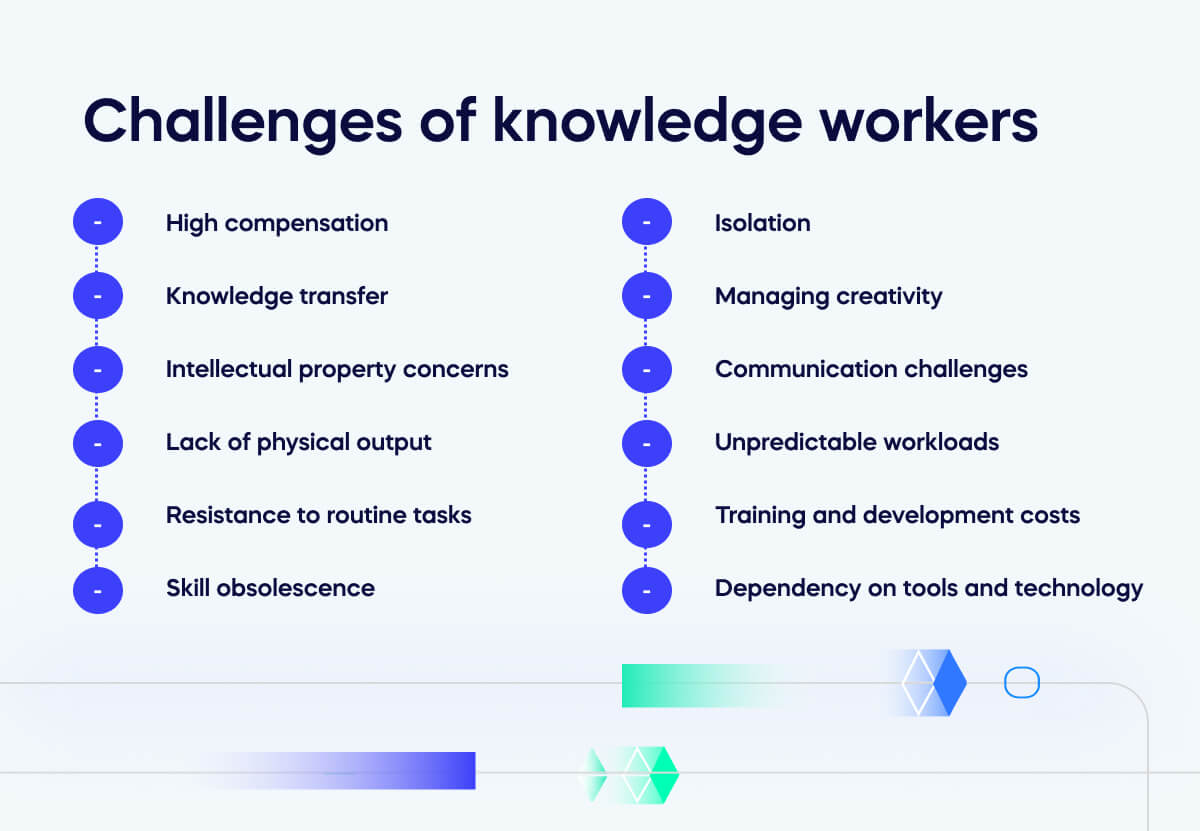
While knowledge workers bring significant benefits to organizations, they also face challenges and drawbacks that can impact both their work and the organizations they serve.
Here are some of the challenges and disadvantages associated with knowledge workers:
High compensation
Knowledge workers often command higher salaries due to their specialized skills and expertise, which can strain an organization’s budget.
Knowledge transfer
When knowledge workers leave an organization, they take their expertise with them, potentially leading to knowledge gaps and continuity issues.
Intellectual property concerns
Protecting intellectual property is critical, as knowledge workers may have access to sensitive or proprietary information at risk of theft or misuse.
Lack of physical output
Knowledge work often lacks tangible or visible output, making measuring productivity and evaluating performance challenging.
Resistance to routine tasks
Knowledge workers may resist routine or repetitive tasks, which can be necessary but less engaging, leading to inefficiencies.
Skill obsolescence
Rapid technological advancements and changing industry trends can render knowledge and skills obsolete, necessitating continuous learning and adaptation.
Isolation
Remote work and solitary problem-solving can lead to feelings of isolation and reduced collaboration among knowledge workers. Gartner forecasts that 39% of global knowledge workers will work hybrid by the end of 2023, indicating that these employees value a mixture of individual focus and working with others.
Managing creativity
Encouraging creativity and innovation while maintaining consistency and quality can be a balancing act, and managing creative personalities can be challenging.
Communication challenges
Effective communication of complex ideas to non-specialists can be challenging, potentially leading to misunderstandings or miscommunication.
Unpredictable workloads
Knowledge work may involve variable workloads, with intense periods of activity followed by quieter times, making resource allocation and scheduling challenging.
Training and development costs
Organizations must invest in training and development to keep knowledge workers up-to-date, which can be costly and time-consuming.
Dependency on tools and technology
Knowledge workers rely heavily on technology and tools, making them vulnerable to disruptions and technical issues.
Knowledge worker vs information worker
Sometimes, people will use the terms ‘knowledge worker’ and ‘information worker’ interchangeably, but they have different meanings in the workplace.
Knowledge workers are primarily focused on creating, manipulating, and applying their expertise and intellect. While information workers typically handle data and information, providing more administrative or supportive functions.
Generally speaking, information workers will process, manage, and organize information rather than create new knowledge. That being said, some more in-depth differences are outlined below:
Nature of work
- Knowledge workers are primarily involved in creating and applying knowledge, requiring problem-solving, decision-making, and innovation.
- Information workers focus on processing, organizing, and disseminating information in administrative and process-driven roles.
Skill and expertise
- Knowledge workers typically possess specialized education and expertise in their fields, which enable them to analyze, synthesize, and create knowledge.
- Information workers may not demand the same level of specialization, often following established procedures and guidelines.
Decision-making
- Knowledge workers are autonomous and responsible for making critical decisions guided by their expertise and judgment.
- Information workers often make rule-based decisions following predefined procedures.
Innovation
- Knowledge workers are more likely to generate innovative ideas, strategies, and solutions. They contribute significantly to organizational development through their creativity and intellectual contributions.
- Information workers focus less on innovation and more on executing tasks and processes efficiently.
Work complexity
- Knowledge workers often grapple with complex, open-ended problems and projects, necessitating critical thinking, analysis, and adaptability to changing circumstances.
- Information workers manage routine and structured tasks, including data entry, document management, and information retrieval.
Job roles
- Knowledge workers are engaged in various professions, such as research, software development, marketing, management, law, healthcare, and design.
- Information workers may include administrative assistants, data entry clerks, customer service representatives, and those engaged in data management and support functions.
Automation
- Knowledge workers are less susceptible to complete automation due to their reliance on creative thinking, expertise, and judgment.
- Information workers are more vulnerable to automation, leading to potential shifts in their job responsibilities.
Scaling up knowledge sharing with knowledge management
Knowledge management (KM) is a discipline and a set of practices aimed at helping knowledge workers store, share, and use information more efficiently within an organization.
It involves systematically collecting, storing, and distributing knowledge, both tacit (personal insights and expertise) and explicit (documents and data).
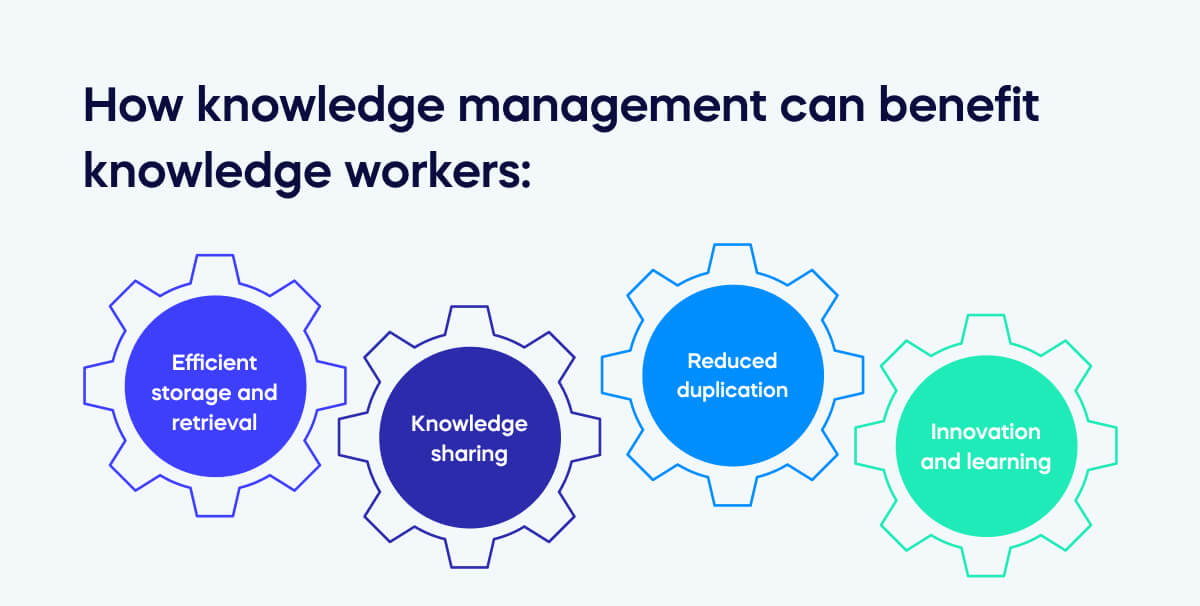
Here’s how knowledge management can benefit knowledge workers:
Efficient storage and retrieval
- Provides tools and systems for organizing and storing knowledge.
- Promotes ease of access, reducing the time spent searching for data.
Knowledge sharing
- Encourages the sharing of expertise and insights among employees.
- Allows for more effective collaboration, leading to better decision-making and problem-solving.
Reduced duplication
- Helps prevent duplication of efforts by making existing knowledge easily discoverable.
- Prevents knowledge workers from recreating content or existing solutions within the organization.
Innovation and learning
- Knowledge workers can learn from each other’s experiences and build upon existing knowledge.
- Fosters innovation in the workplace.
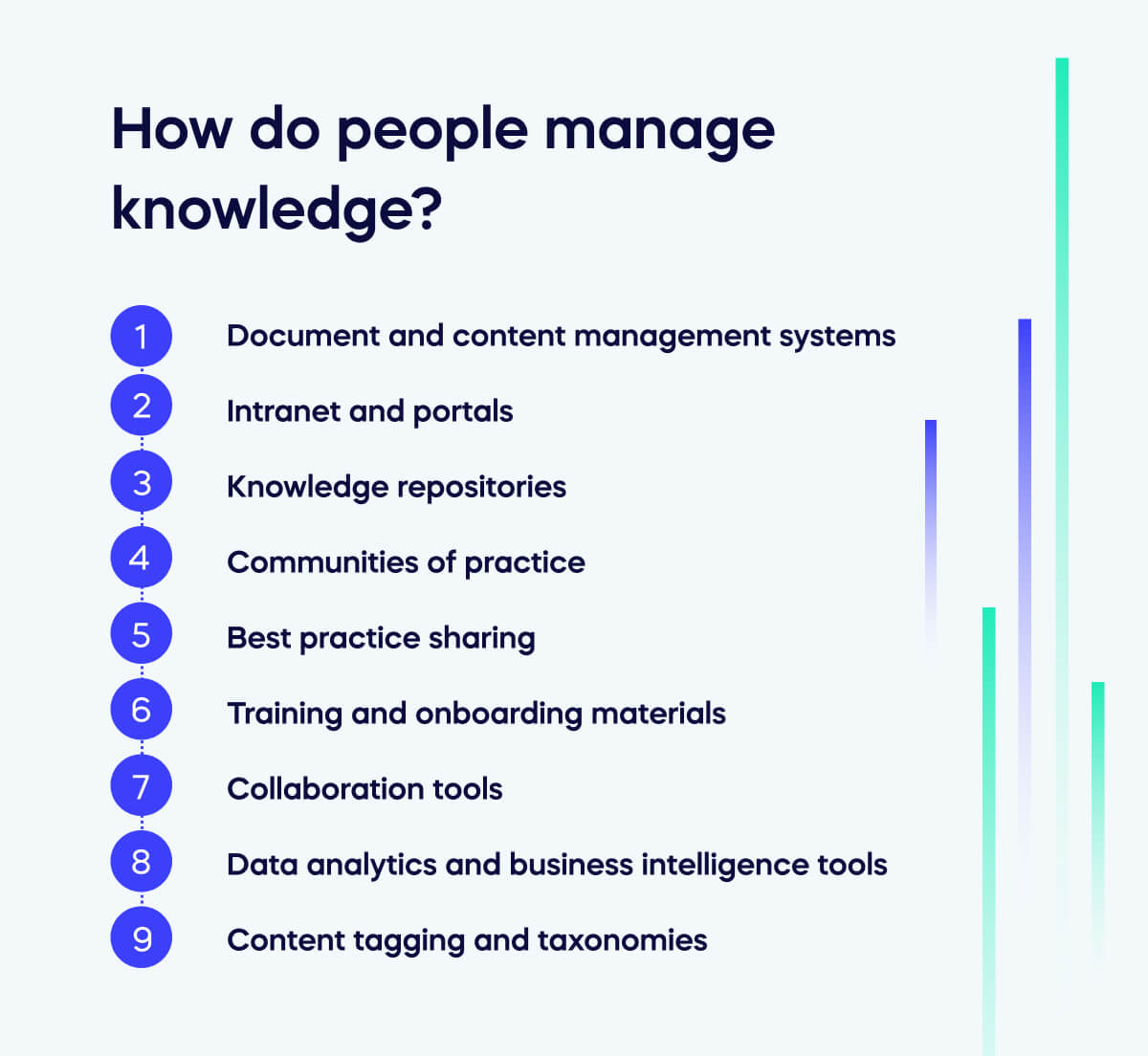
How do people manage knowledge? Here are some of the systems and techniques:
Document and content management systems
These systems (e.g., SharePoint, Dropbox, Google Drive) help organize and store documents, reports, and other content in a structured manner, making it easily accessible to knowledge workers.
Intranet and portals
Organizations often have internal websites or portals where employees can access information, news, and resources. These can serve as central hubs for knowledge sharing.
Knowledge repositories
These are databases or libraries of information, best practices, case studies, and lessons learned. They serve as a reference for knowledge workers. For instance, a law firm might have a repository of legal precedents and case summaries.
Communities of practice
These are groups within an organization where members with similar interests or expertise share knowledge. This could include forums, discussion boards, or regular meetings.
Best practice sharing
Organizations can encourage knowledge workers to share their best practices and lessons learned. This can be done through reports, presentations, or knowledge-sharing sessions.
Training and onboarding materials
Knowledge management can involve creating and maintaining training materials and resources to help onboard new employees and keep existing ones up to date.
Collaboration tools
Tools like Slack, Microsoft Teams, and others facilitate real-time communication and collaboration, allowing knowledge workers to exchange information and ideas.
Data analytics and business intelligence tools
These tools can help organizations collect and analyze data to gain insights and make data-driven decisions.
Content tagging and taxonomies
Assigning metadata and organizing content with tags and taxonomies can make it easier for knowledge workers to find relevant information.
It’s important not to overload knowledge workers with systems – a survey from Gartner reveals that 47% of digital workers struggle to find the information they need to effectively perform their jobs due to a flood of information and applications in their digital workplace.